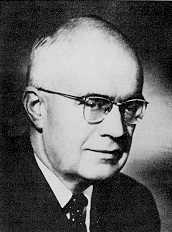Vous pouvez contribuer simplement à Wikibéral. Pour cela, demandez un compte à adminwiki@liberaux.org. N'hésitez pas !
Oskar Lange
| Oskar Lange | |||||
| économiste | |||||
|---|---|---|---|---|---|
| Dates | 1904 - 1965 | ||||

| |||||
| Tendance | Socialiste | ||||
| Nationalité | |||||
| Articles internes | Autres articles sur Oskar Lange | ||||
| Citation | |||||
| Interwikis sur Oskar Lange | |||||
Oskar Ryszard Lange, né le 27 juillet 1904 à Tomaszów Mazowiecki et mort le 2 octobre 1965 à Londres, est un économiste et diplomate polonais. Il est connu pour avoir participé au débat intellectuel sur la possibilité du calcul économique dans une économie socialiste lancé par Ludwig von Mises dès les années 1920.
Présentation
Il enseigna brièvement au Royaume-Uni ou aux États-Unis dans les années 1930 où il côtoya Joseph Schumpeter. Il retourna en Pologne communiste quand le rideau de fer tomba et entama une carrière de diplomate tout en continuant son œuvre économique.
Il prit part au débat intellectuel sur la possibilité du calcul économique dans une économie socialiste lancé par Ludwig von Mises avec son article de 1920 Le calcul économique en régime collectiviste. Mises y montrait que, en se privant du mécanisme des prix, le communisme se prive de toute possibilité de calcul économique et donc de la possibilité même d'une économie. Avec Fred M. Taylor, Lange tenta d'y répondre en proposant un « socialisme de marché », où les prix, sans être libres, seraient fixés par l'État, par « essai et erreur », en mimant les mécanismes des acteurs du marché. Autrement formulé, la seule solution possible pour faire fonctionner la planification est que l'autorité centrale copie ces acteurs du marché de façon moins efficiente. Friedrich Hayek fit une critique détaillée de ces thèses du socialisme de marché, en insistant sur le rôle de vecteur d'information du système de prix libres.
Lange s'est également intéressé à d'autres aspects de l'économie, remettant en cause le dogme marxiste au profit d'une relecture de ses concepts fondamentaux à la lumière de l'éclairage de l'école néoclassique. Il était en particulier très critique de la théorie de la valeur-travail marxiste.
Œuvres
- 1934, "The Determinateness of the Utility Function",RES.
- 1935, "Marxian Economics and Modern Economic Theory".
- 1936,
- a. "The Place of Interest in the Theory of Production", RES
- b. "On the Economic Theory of Socialism", RES.
- c. "On the Economic Theory of Socialism, I"
- 1937, "On the Economic Theory of Socialism, II"
- 1938,
- a. On the Economic Theory of Socialism.
- b. "The Rate of Interest and the Optimum Propensity to Consume", Economica
- "Saving and Investment: Saving in process analysis", 1939, QJE
- "Is the American Economy Contracting?", 1939, AER
- 1940, "Complementarity and Interrelations of Shifts in Demand", RES
- 1942,
- a. "Theoretical Derivation of the Elasticities of Demand and Supply: the direct method", Econometrica
- b. "The Foundations of Welfare Economics", Econometrica
- c. "The Stability of Economic Equilibrium", Econometrica.
- d. "Say's Law: A restatement and criticism", In: Oskar Lange et al., dir., "Studies in Mathematical Economics and Econometrics", Chicago: University of Chicago Press, pp49–68
- 1943,
- a. "A Note on Innovations", REStat
- b. "The Theory of the Multiplier", Econometrica
- 1944,
- a. "Strengthening the Economic Foundations of Democracy", with Abba Lerner, American Way of Business.
- b. Price Flexibility and Employment, 1944.
- c. "The Stability of Economic Equilibrium" (Appendix of Lange)
- d. "The Rate of Interest and the Optimal Propensity to Consume" 1944, in Haberler, editor, Readings in Business Cycle Theory.
- 1945,
- a. "The Scope and Method of Economics", RES.
- b. "Marxian Economic in the Soviet Union", AER.
- 1949, "The Practice of Economic Planning and the Optimum Allocation of Resources", Econometrica
- 1953, "The Economic Laws of Socialist Society in Light of Joseph Stalin's Last Work", Nauka Paulska (repr. IER, 1954).
- 1958,
- a. The Political Economy of Socialism.
- b. Introduction to Econometrics.
- 1959, Political Economy.
- 1960, "The Output-Investment Ratio and Input-Output Analysis", Econometrica
- 1961
- a. Theories of Reproduction and Accumulation
- b. Economic and Social Essays, 1930-1960
- 1963,
- a. Economic Development, Planning and Economic Cooperation.
- b. Essays on Economic Planning
- 1964, Optimal Decisions: principles of programming.
- 1965,
- a. Wholes and Parts: A general theory of system behavior.
- b. Introduction to Economic Cybernetics.
- 1967, "The Computer and the Market", in Feinstein, editor, Socialism, Capitalism and Economic Growth.
Voir aussi
Littérature secondaire
- 1946, Milton Friedman, "Lange on Price Flexibility and Employment: A Methodological Criticism", American Economic Review, 36, no. 4, p. 613-631. Réimprimé dans Essays in Positive Economics, pp277-300
- 1971, Murray Rothbard, Lange, Mises and Praxeology: The Retreat from Marxism, In: Friedrich Hayek, dir., Towards Liberty: Essays in Honor of Ludwig von Mises, 2 vols, Menlo Park, CA : Institute for Human Studies
- 1973, E. Neuberger, "The Plan and the Market: The Models of Oskar Lange", American Economist, vol 17, pp148–153
- 1977, Charles Sadler, "Pro-Soviet Polish-Americans: Oskar Lange and Russia's Friends in the Polonia, 1941–1945", Polish Review, Vol 22, n°4, pp25–39
- 1987, Thadeusz Kowalik, "Lange, Oskar R.", The New Palgrave: A Dictionary of Economics, 3, pp123-129
- 1991, Joseph Persky, Lange and von Mises, Large-Scale Enterprises, and the Economic Case for Socialism: Retrospectives, Journal of Economic Perspectives, American Economic Association, vol. 5(4), Fall, pp229-236
- 2002, Jan Hanousek et Randall K. Filer, "Lange and Hayek revisited: lessons from the Czech voucher privatization", Cato Journal, Vol 21, n°3, Winter, pp491-498
- Repris en 2004, In: John Cunningham Wood, et Robert D. Wood, "Friedrich A. Hayek: Critical Assessments of Leading Economists", vol 4, London: Routledge, pp463-470
- 2006, Douglas W. MacKenzie, "Oscar Lange and the impossibility of economic calculation", Studia Ekonomiczne (Economic Studies), vol 1, n°1-2, pp105-121
Liens internes
Liens externes
| Accédez d'un seul coup d’œil au portail économie. |